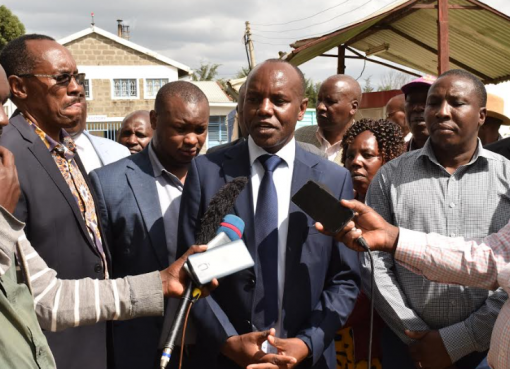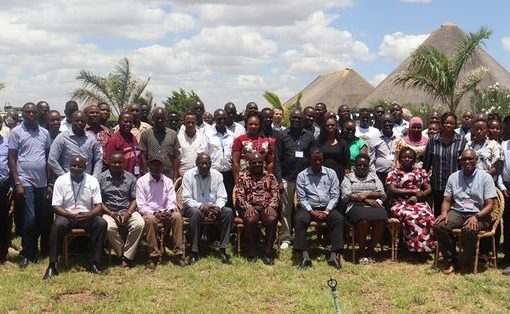Farmers have been encouraged to embrace organic farming system to realize maximum yields from their small holder acreages to promote biodiversity and sustaining the fertility of the soil.
Sam Nderitu, the founder of Global Intensive Agriculture Centre of Kenya (G-BIACK) an organisation based in Kiambu County and has been instrumental in training smallholder farmers in agro ecology farming says organic farming practices ensured that the soil fertility was maintained and enriched since most of the input applied were biodegradable.
He said through such trainings G-BIACK had equipped small holder farmers with the skills to fully exploit the potentials of their farms in wider goal of reducing poverty levels as well as improving food security and their general standard of living.
“Global intensive is an organisation based in Kiambu that trains and encourages small holder farmers with one to five acres of land to practice to embrace agroecology to increase their production”, he told Kenya News Agency during an interview.
Noting that going organic was the most sustainable way of farming because it entailed use of resources that the farmers could easily access, Nderitu said the concept offered healthy and safe food and played a role in mitigating against the effects of climate change because pesticides and other inputs with residual effects to the environment were not applied.
“Some of the chemicals used as farm inputs pose grave risk to the eco system as they produces carbon into the atmosphere thereby worsening volumes of toxic emissions to the environment and at the same time expose consumers of such produce to disease such as cancer” he said.
He explained that going organic means using what they call a closed loop system where all the food produced can also be recycled. “For example, if a farmer produces maize and beans and other crops, the waste of these crops is supposed to return to the same soil”, he said
He added that the farmers could also use animal waste to produce compost manure which has more carbon materials and nitrogen so a farmer doesn’t need to pump in a lot of nitrogen to the soil.
“An 1/8 of an acre according to the research that we have carried out is able to feed one person throughout the year and the farmer will be able to produce the food and at the same time derive some income from the same parcel if well utilized”, he said
He however said going organic was a process that could take up to six years for the farmers to fully transition from conventional to organic farming to realize maximum benefits from the concept.
He stressed that it entails taking one step at a time because one will have to use a lot of organic matter to clean the residual effects of chemical fertilizers deposited in the soil saying the soil in the country was too acidic owing to the decline in production.
“I am not saying that soil that has higher acidity levels is totally bad because there are some crops that do well under such conditions but a majority of crops under the ideal situation thrive in soil whose PH value is 4.0 and below. He said
Nderitu decried that the country was gradually turning into a net importer of food stuff that were once available in abundance because the soil for agriculture production was rendered infertile due to excessive use of chemical over a period of time.

He said it time farmers were empowered to focus on soil fertility management by testing the deficiencies in the soil before recommending the missing ingredients and possible remedies to improve the fertility and the right crop to be grown in a particular area.
“Any cured manure, he explained, has the elements that are needed by the plant, because one feeds the soil and the soil feeds the plant as opposed to applying chemical fertilizers in the soil which feeds the plant and destroys the soil” Nderitu said.
“Kenyans have to wake up and think about the soil, because when talking about the soil, you are also talking about the generations to come. What kind of a generation do you want? Do you want a generation that’s borrowing food from other countries? We need to think about growing our own food. Kenya should grow and eat the food that Kenyans grow” he posed.
Nderitu said as the 2023 Conference of the Parties of the UNFCCC, more commonly referred to as COP 28 nears, it will be of no importance if the meeting does not discuss matters Agro ecology and supporting of farmers to go organic.
The 28th United Nations Climate Change conference to be starts from 30th November until 12th December 2023, at the Expo City, Dubai.
Emmanuel Atamba. the founder and CEO of APSID Consulting, a firm that provides consultancy services in food and farming systems in Kenya said the most it was critical for the country to open candid conversation on agro ecology to transform the food systems
He expressed fears that the country was still grappling with food security challenges despite spending millions of resources and initiatives to address the ever elusive struggle to secure a meal for each and every person in the world.
He explained that according to FAO, still more than 750 million people globally were food insecure and this is a clear indicator that conversation for alternative approach to the problem was required to turn around the trend.
“Agro ecology for me is a paradigm shift where we are looking at how we reinvent our agricultural activities so that we align ourselves with nature rather than working against nature.
Today, Atamba said the government was fixated with lowering the cost of fertilizer and despite offering subsidies to make it affordable only pockets of farmers could meet the costs hence there is need to review the approach and focus on agro-ecology and enable farmers have access to quality seeds that are productive, viable and climate resilient te realize the desired yields
“Matters of going organic he added is about farmers, producers and the whole value chain that is geared towards getting nutritious diverse foods, about changing the way we perceive food and changing the way we perceive agriculture not only as a victim of climate change but a potential solution to the climate crisis”, he said
He added that we need to redesign our food production systems to take into account the current context of the climate crisis and the solution is recognizing farmers, producers as managers of landscapes and supporting them.

“Going organic is a timely conversation especially now that all of us are worried whether we are going to have a meal 10 years from now or not. This is the time to ask ourselves why are we worried, why are we scared. Because basically we are standing on shaky ground. We are standing upon a system that is not sustainable, that is not resilient, that cannot see us through the next few generations as humans”, Atamba said.
He said transitioning to agro ecology should not be left to farmers alone as it requires adapting to climate change and this will require resources. Government, he said, needs to ensure that they are supporting the farmers for them to adapt through various investments, advocacy, and politically directing the right amount of resources in agro ecology.
“We can accelerate through providing information, providing knowledge, things like what, for example, the G-BIACK Center is doing, of training farmers and exposing farmers to alternative ways of thinking and looking at food systems,” Atamba said
He however said that it is important that the consumers also be part of the conversation and that they should learn to choose food not because it’s cheaper, but because it is better for them, the environment and also of benefit
Atamba reiterated Nderitu’s sentiments saying that the upcoming COP 28 meeting discussions will be key because they are guiding the global thinking around addressing the climate crisis and food systems or agriculture are not only affected by climate change but are also a potential avenue for solutions and interventions towards the climate crisis.
By Wangari Ndirangu





